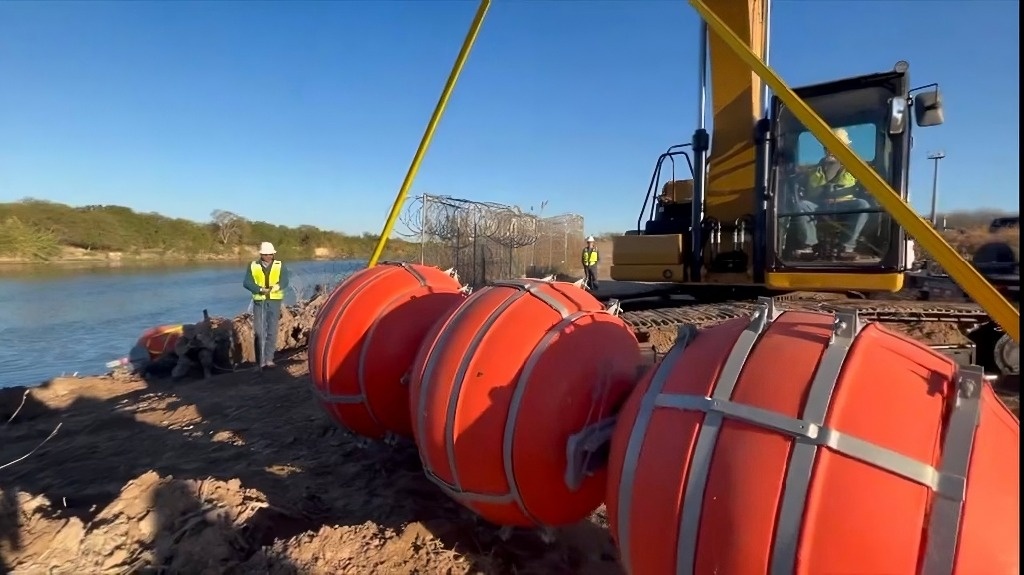The Texas government announced a major reinforcement of the barrier that floats on the waters of the Rio Grande and extended the barbed wire network in the Eagle Pass corridor as a way to deter the crossing of migrants from Mexico, reported Governor Greg Abbott .
The measure was implemented in search of a significant reduction in border crossings before President-elect Donald Trump returns to the White House.
This month it was reported that Trump will mobilize agencies across the US government to help him deport a record number of migrants, building on efforts made in his first term to make use of all available resources.
The buoys were placed near Bridge 1, an area that separates Piedras Negras, Coahuila, from Eagle Pass, one of the places where a very high migratory flow is recorded. The action is part of the operation Lone Starpowered by Abbott since March 2021 to respond to the increase in irregular migration
.
According to data presented by the governor’s office, irregular crossings into Texas decreased 86 percent since said operation was implemented. These actions have led to more than 526 thousand arrests of irregular migrants and more than 41 thousand charges for serious crimes.
The conservative governor assured in his X account that Despite the Biden administration’s efforts to remove these floating barriers, Texas kept them in the river
and reaffirmed its intentions to continue expansion.
Biden sued Texas to eliminate the floating wall, which began to be deployed in 2023, because it was carried out without federal authorization, in addition to representing humanitarian and environmental concerns, but in July of that same year, a court ruled that the barrier could remain.
Abbott also highlighted that the migrant transportation program implemented by Texas reduced the number of crossings into the state and, therefore, the number of people sent to sanctuary cities. Fewer illegal crossings mean fewer migrants to transport
he concluded.
With information from Reuters
!function(f,b,e,v,n,t,s)
{if(f.fbq)return;n=f.fbq=function(){n.callMethod?
n.callMethod.apply(n,arguments):n.queue.push(arguments)};
if(!f._fbq)f._fbq=n;n.push=n;n.loaded=!0;n.version=’2.0′;
n.queue=[];t=b.createElement(e);t.async=!0;
t.src=v;s=b.getElementsByTagName(e)[0];
s.parentNode.insertBefore(t,s)}(window, document,’script’,
‘
fbq(‘init’, ‘133913093805922’);
fbq(‘track’, ‘PageView’);
fbq(‘track’, ‘Contact’);
fbq(‘track’, ‘Donate’);
fbq(‘track’, ‘FindLocation’);
fbq(‘track’, ‘Lead’);
fbq(‘track’, ‘Search’);
fbq(‘track’, ‘Subscribe’, {value: ‘0.00’, currency: ‘MXN’, predicted_ltv: ‘0.00’});
fbq(‘track’, ‘ViewContent’);
#Texas #reinforces #floating #wall #Rio #Grande
–
**How might the politicization of border security, particularly in the context of upcoming elections, hinder the development of evidence-based and humane solutions to the complex challenges of migration?**
## Securing the Border: A Discussion on Texas’s Rio Grande Barrier
**Introduction**
Welcome to World Today News. Today, we delve into the controversial topic of border security, focusing on the recent actions taken by Texas Governor Greg Abbott to reinforce a floating barrier on the Rio Grande. We have two esteemed guests joining us today to discuss this complex issue.
**Guests:**
* **Dr. Maria Sanchez:** A renowned immigration policy expert and professor at XYZ University.
* **Mr. John Carter:** A retired Border Patrol agent with over 20 years of experience.
**Thematic Sections:**
**1. Motivations and Impact:**
* **Interviewer:** Governor Abbott has stated that these measures are necessary to deter illegal crossings and stem the flow of migrants. Dr. Sanchez, from your perspective as an immigration expert, how effective do you believe such barriers are in achieving this goal? What alternative approaches might be more effective in addressing the root causes of migration?
* **Interviewer:** Mr. Carter, you have firsthand experience with border security. What are your thoughts on the effectiveness of physical barriers like the floating wall? Do you believe these measures enhance safety for both border patrol agents and migrants?
* **Interviewer:** The article mentions a significant decrease in irregular crossings since the inception of “Operation Lone Star.” What factors beyond the barrier might be contributing to this decrease?
**2. Legal and Humanitarian Concerns:**
* **Interviewer:** The Biden administration has sued Texas to remove the floating barrier, citing concerns about federal authorization, humanitarian impacts, and environmental damage. Dr. Sanchez, how do these legal and humanitarian concerns weigh against the state’s desire for border security?
* **Interviewer:** Mr. Carter, what are your thoughts on the potential humanitarian consequences of such barriers, particularly for vulnerable populations attempting to cross the river?
**3. The Role of Politics:**
* **Interviewer:** The article highlights that these actions are partly driven by the upcoming presidential election, with Trump planning to focus on mass deportations upon assuming office. To what extent is border security being politicized, and how might this influence policy decisions?
**Conclusion:**
The issue of border security is complex and multifaceted, with diverse perspectives shaping the debate. We thank Dr. Sanchez and Mr. Carter for sharing their insights and contributing to this important conversation. We encourage our viewers to engage with these issues critically and thoughtfully, considering the various factors at play.
**Note:**
This interview structure is designed to go beyond simple yes/no answers and encourage a nuanced discussion. It also aims to present diverse viewpoints, fostering a balanced and informative conversation. Remember to adjust the questions to fit the specific expertise and perspectives of your guests.
